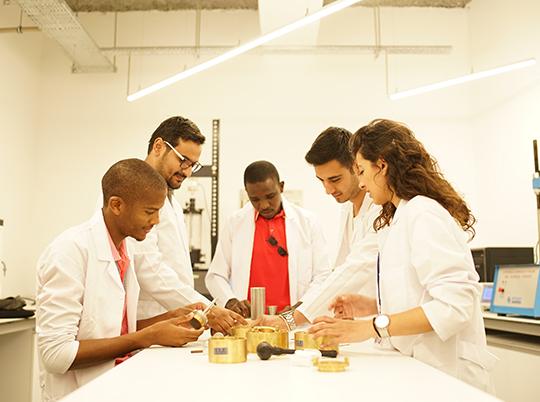


About the Program
The aim of the Energy Systems Engineering Master’s Engineering is to educate and train engineers to work in the field of energy systems engineering who are equipped with the necessary information, gained knowledge and ability to assess and interpret information by doing scientific research and can solve complex energy problems. In addition, graduates of the Energy Systems Engineering Program provide expertise in sub-areas such as renewable energy systems, energy management, energy policy, energy efficient production / consumption, energy-environment relations, energy economics, energy systems modeling. The use of fossil fuels pollutes the environment and they have become an undesired source of source due to their endangerment and ever-increasing costs. Another goal of the program is concerned with educating professionals who specialize in alternative and sustainable energy sources. In terms of science, the Master of Science (M.Sc.) education will accelerate the research activities carried out in the Energy Systems Engineering Master’s Program.
Education Opportunities
Master of Science (M.Sc.) in Energy Systems Engineering has two sub-programs; the thesis and non-thesis program. The thesis program consists of seven courses, seminar and a thesis. Two of the seven courses are compulsory; and from the remaining five courses, two are program-based elective courses, and three are graduate-level elective courses from other engineering programs. The non-thesis program is designed for those who would like to improve themselves for educational and professional purposes. The non-thesis program consists of ten courses and a graduation project. Two of these courses are compulsory, five are program-based elective courses, and the remaining three courses are graduate-level elective courses from other engineering programs. The program offers courses on issues such as past, present and future of energy; techno-economic analysis of energy practices; solar power design; integration of renewables; modern economic problems in energy systems; and fundamentals of optimization of energy systems.

Career Areas
Students who successfully complete their M.Sc. in Energy Systems Engineering and wish to continue their academic career can apply for the Ph.D. programs at the national and international institutions. Program graduates who do not prefer to continue their career academically can be employed in national and international fields related to their professions in the public and private sectors or they may establish their own businesses. Program graduates can work in the fields of energy storage devices, energy storage materials, fuels and combustion, energy conversion systems, solar energy, wind energy, biofuels, energy efficiency, energy management, energy politics/policies, power generation, transmission and distribution, intelligent networks and electric / hybrid electric vehicles.
Contact
Institute of Graduate Studies and Research
Graduate Sciences and Education Center, GE106
Tel: +90 392 671 1111 Extension: 2776
Institute E-mail: ciu-institute@ciu.edu.tr
Compulsory Courses
First Semester
ENERGY - PAST, PRESENT & FUTURE
Course code
ENRE501Credit
3Theoretical
3Practical
0Ects
8TECHNO-ECONOMICAL ANALYSIS OF ENERGY APPLICATIONS
Course code
ENRE502Credit
3Theoretical
3Practical
0Ects
8SEMINAR
Course code
ENRE590Credit
0Theoretical
0Practical
0Ects
4FREE ELECTIVE I
Course code
ENRE5X1Credit
3Theoretical
3Practical
0Ects
8FREE ELECTIVE II
Course code
ENRE5X2Credit
3Theoretical
3Practical
0Ects
8FREE ELECTIVE III
Course code
ENRE5X3Credit
3Theoretical
3Practical
0Ects
8FREE ELECTIVE IV
Course code
ENRE5X4Credit
3Theoretical
3Practical
0Ects
8FREE ELECTIVE V
Course code
ENRE5X5Credit
3Theoretical
3Practical
0Ects
8Second Semester
THESIS
Course code
ENRE500Credit
0Theoretical
0Practical
0Ects
60Elective Courses
RESEARCH METHODS
Course code
EMNT525Credit
3Theoretical
3Practical
0Ects
0SOLAR POWER DESIGN
Course code
ENRE507Credit
3Theoretical
3Practical
0Ects
CIRCUIT THEORY II
Course code
EEE301Credit
0Theoretical
0Practical
0Ects
6ENERGY SYSTEMS II
Course code
ENRE306Credit
0Theoretical
0Practical
0Ects
CIRCUIT THEORY I
Course code
EEE202Credit
0Theoretical
0Practical
0Ects
HEAT AND MASS TRANSFER
Course code
ENRE302Credit
0Theoretical
0Practical
0Ects
FUNDAMENTALS OF ENERGY SYSTEMS OPTIMIZATION
Course code
ENRE533Credit
3Theoretical
3Practical
0Ects
ENGINEERING ECONOMY
Course code
INDE232Credit
0Theoretical
0Practical
0Ects
FLUID MECHANICS
Course code
CVL331Credit
0Theoretical
0Practical
0Ects
THERMODYNAMICS
Course code
ENRE301Credit
0Theoretical
0Practical
0Ects
DESIGN OF ZERO EMISSION 100% RENEWABLE CITIES
Course code
ENRE537Credit
3Theoretical
3Practical
0Ects
POWER GENERATING SYSTEMS
Course code
ENRE534Credit
3Theoretical
3Practical
0Ects
INTEGRATION OF RENEWABLES
Course code
ENRE512Credit
3Theoretical
3Practical
0Ects
INTERMEDIATE HEAT AND MASS TRANSFER
Course code
ENRE522Credit
3Theoretical
3Practical
0Ects
PROJECT SCHEDULING
Course code
EMNT503Credit
3Theoretical
3Practical
0Ects
TOTAL QUALITY MANAGEMENT
Course code
EMNT502Credit
3Theoretical
3Practical
0Ects
0INTERMEDIATE FLUID MECHANICS
Course code
ENRE521Credit
3Theoretical
3Practical
0Ects
PRODUCTION PLANNING AND SCHEDULING
Course code
EMNT501Credit
3Theoretical
3Practical
0Ects
0HAZARDOUS AND TOXIC WASTES - TREATMENT AND CONTROL
Course code
ENVE505Credit
3Theoretical
3Practical
0Ects
POWER SYSTEM ENGINEERING AND ECONOMICS
Course code
ENRE506Credit
3Theoretical
3Practical
0Ects
SMART POWER GRIDS
Course code
ENRE535Credit
3Theoretical
3Practical
0Ects
HYDROGEN AND FUEL CELL TECHNOLOGY
Course code
ENRE511Credit
3Theoretical
3Practical
0Ects
INDUSTRIAL WASTE TREATMENT
Course code
ENVE523Credit
3Theoretical
3Practical
0Ects
POWER ELECTRONICS APPLICATIONS FOR RENEWABLE ENERGY SYSTEMS
Course code
ENRE505Credit
3Theoretical
3Practical
0Ects
ADVANCED GAS TURBINES
Course code
ENRE514Credit
3Theoretical
3Practical
0Ects
NUCLEAR REACTOR PHYSICS
Course code
ENRE529Credit
3Theoretical
3Practical
0Ects
PHOTOVOLTAIC SYSTEMS
Course code
EELE582Credit
3Theoretical
3Practical
0Ects
0ADVANCED AIR POLLUTION
Course code
ENVE509Credit
3Theoretical
3Practical
0Ects
RENEWABLE ENERGY POLICIES & SCENATIOS
Course code
ENRE524Credit
3Theoretical
3Practical
0Ects
MODERN ECONOMIC ISSUES IN ENERGY SYSTEMS
Course code
ENRE527Credit
3Theoretical
3Practical
0Ects
FLUID MECHANICS
Course code
MCLE382Credit
0Theoretical
0Practical
0Ects
6SOLAR - THERMAL ENERGY AND ITS APPLICATIONS
Course code
EELE581Credit
3Theoretical
3Practical
0Ects
COMPUTER AIDED DATA ANALYSIS
Course code
EMNT515Credit
3Theoretical
3Practical
0Ects
SUPPLY CHAIN MANAGEMENT
Course code
EMNT524Credit
3Theoretical
3Practical
0Ects
ENGINEERING ETHICS
Course code
EMNT560Credit
3Theoretical
3Practical
0Ects
ANAEROBIC BIOTECHNOLOGY FOR INDUSTRIAL WASTEWATERS
Course code
ENVE507Credit
3Theoretical
3Practical
0Ects
ENVIRONMENTAL BIOTECHNOLOGY
Course code
ENVE525Credit
3Theoretical
3Practical
0Ects
ADVANCED ENGINEERING THERMODYNAMICS
Course code
ENRE605Credit
3Theoretical
3Practical
0Ects
RESEARCH TEHCNIQUES IN HUMAN ENGINEERING
Course code
EMNT516Credit
3Theoretical
3Practical
0Ects
OPERATIONS RESEARCH TECHNIQUES
Course code
EMNT517Credit
3Theoretical
3Practical
0Ects
0POWER SYSTEM HARMONICS
Course code
EELE557Credit
3Theoretical
3Practical
0Ects
INVESTMENT APPRAISAL
Course code
ACFN519Credit
3Theoretical
3Practical
0Ects
0ECOLOGY
Course code
ENVS502Credit
3Theoretical
3Practical
0Ects
EXERGY AND EXERGY-ECONOMIC ANALYSIS OF RENEWABLE SYSTEMS
Course code
ENRE606Credit
3Theoretical
3Practical
0Ects
MANAGEMENT SCIENCE
Course code
MISY555Credit
3Theoretical
3Practical
0Ects
INTERMEDIATE THERMODYNAMICS
Course code
MCLE511Credit
3Theoretical
3Practical
0Ects
8STRATEGIC PLANNING
Course code
EMNT510Credit
3Theoretical
3Practical
0Ects
PRODUCTION AND INVENTORY THEORY
Course code
EMNT514Credit
3Theoretical
3Practical
0Ects
ANAEROBIC BIOTECHNOLOGY FOR INDUSTRIAL WASTEWATERS
Course code
ENVS507Credit
3Theoretical
3Practical
0Ects
BIOSEPERATIONS
Course code
BIOE506Credit
3Theoretical
3Practical
0Ects
CIRCUIT THEORY II
Course code
EEE301Credit
4Theoretical
4Practical
0Ects
Students who are interested in pursuing advanced graduate studies leading to a master’s, doctoral degree, or professional doctorate degree for the Fall and Spring semesters every year. Applicants can directly apply online to our graduate programs using the application portal.
TR Applicants- Required documents:
- Bachelor’s Degree Diploma
- Bachelor’s Degree transcripts for each completed academic term/year.
- Valid ALES result document (must not exceed 5 years),
- Documents to prove English proficiency for English language departments,
- Scanned copy of passport or identity card.
Click for detailed admission requirements information.
TRNC Applicants- Required documents:
- Bachelor’s Degree Diploma
- Bachelor’s Degree transcripts for each completed academic term/year.
- Documents to prove English proficiency for English language departments,
- Scanned copy of passport or identity card.
Click for detailed admission requirements information.
Students who are interested in pursuing advanced graduate studies leading to a master’s, doctoral degree, or professional doctorate degree for the Fall and Spring semesters every year. Applicants can directly apply online to our graduate programs using the application portal.
International Applicants- Required documents;
- Bachelor’s Degree Diploma
- Bachelor’s Degree transcripts for each completed academic term/year.
- Evidence of English Language competence: TOEFL (65 IBT) or IELTS (5.5). Students without these documents will take the CIU English proficiency exam on campus following arrival.
- Scanned copy of international passport/birth certificate
- CV
- Fully completed and signed CIU Rules and Regulations document (which can be downloaded during the online application)
Click for detailed admission requirements information.
Cyprus International University provides academic scholarships for its students as an incentive for success, with most students benefiting from 50%, 75% or 100% scholarships or discounted tuition fees. Click for more information.
Tuition Fees are determined at the beginning of each academic year. Candidate students who are entitled to enroll in CIU can learn their fees in line with the Tuition Fee Calculation system.